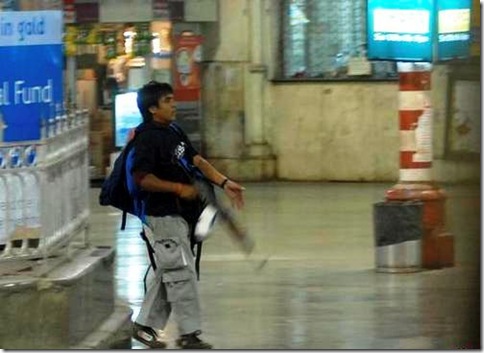
Mohammed Ajmal Amir Kasab [Photograph: Sebastian D'souza/AP]
Mohammed Ajmal Amir Kasab, a 21-year-old Pakistani citizen, has been found guilty of murder, conspiracy and waging war on India by the Mumbai Special Court held in the Arthur Road Jail. The charges relate to the November 2008 terror attacks in Mumbai which lasted for three days and resulted in the deaths of at least 173 people and wounded 308 others. Together with an accomplice, Ajmal Amir was directly responsible for the deaths of 58 people and the wounding of 104 as he walked around one of Mumbai’s busiest railway stations and shot indiscriminately into the crowd. He was the only one of ten gunmen that was captured alive.
To view the article I wrote about the Mumbai terror attacks last year and see the explosive Dispatches video footage, visit Dispatches – Terror in Mumbai.
The trial began on 8 May 2009 and recorded 3,192 pages of evidence, examined 658 witnesses and worked for 271 days. Ajmal Amir has been specifically disingenuous throughout the whole process. There is footage in the Dispatches video on the night of his capture showing him candidly (and voluntarily) discussing the aim of the terrorists to kill as many people as possible yet he gave a plea of not guilty on 6 May 2009. He retracted his not-guilty plea and pleaded guilty to all charges on 20 July 2009 and then in a dramatic turn of events, he claimed he was innocent on 18 December 2009. He told the court he had arrived in Mumbai 20 days before the attacks had started and that police had arrested him a couple of days before the attacks. They had then shot him and made it look like he was involved in the attacks.
Thankfully, video footage and the testimony of several eye witnesses meant that his claims held little weight. Perhaps most significantly, the court accepted the prosecution contention that “the conspiracy of the 26/11 attack was hatched on Pakistani soil and inevitable inference can be drawn that the attack was state-sponsored” which prosecutor Ujjwal Nikam claimed in his closing arguments.
Ajmal Amir will be sentenced in the next couple of days and there is a strong possibility that he will be sentenced to death by hanging. Once he has been sentenced, the case must go to India’s high court for ratification. Ajmal Amir can then appeal to the supreme court and if that is not successful he can appeal to the president for mercy. Considering the lack of mercy he showed his victims and the numerous times he has lied and attempted to delay the process, I doubt he will be shown mercy by anyone.
Apart from the massive loss of life and the destruction of families and property, one of the greatest tragedies here is that young boys were taken in by the terrorist organisation Lashkar-e-Taiba and they were indoctrinated and given basic, commando and advanced training. A theme in many of these situations is that Ajmal Amir showed only a basic understanding of the purpose of the attacks beyond killing and the promise of an after-life afforded to ‘martyrs’. Naturally, the fight against terrorism does not end with carrying out the sentence against Ajmal Amir, but that is a topic for another post.
Naming of Ajmal Amir: I have referred to the terrorist in this article as Ajmal Amir but you will often see him referred by the full Mohammed Ajmal Amir Kasab. It is possible that he does not have a surname and that ‘Kasab’ may have referred to a caste origin or profession. ‘Mohammed’ is his father’s name.

No comments
Post a Comment